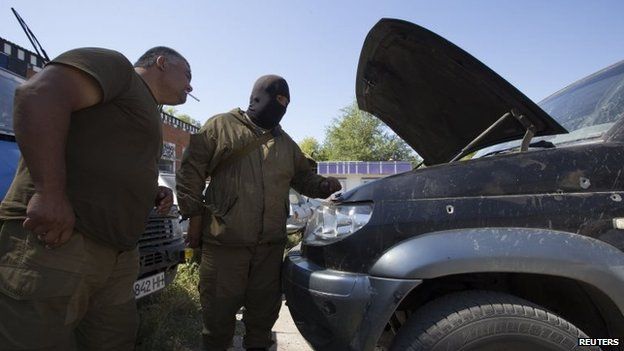Putin 'urges talks on statehood for east Ukraine'
- Published

Russian President Vladimir Putin has called for talks to discuss "statehood" for eastern Ukraine.
He said the issue needed to be discussed to ensure the interests of local people "are definitely upheld".
His comments came after the EU gave Russia a one-week ultimatum to reverse course in Ukraine or face sanctions.
Russia denies Western accusations that its forces illegally crossed into eastern Ukraine to support separatists there.
"Russia cannot stand aside when people are being shot at almost at point blank," he added, describing the rebels' actions as "the natural reaction of people who are defending their rights".
He dismissed the EU's threat of further sanctions, accusing the EU of "backing a coup d'etat" in Ukraine.
The West, Mr Putin said, should have foreseen Russia's reaction to the situation, adding it was impossible to predict how the crisis would end.
Mr Putin's spokesman, Dmitry Peskov, later said the president's remarks on "statehood" should not be taken to mean an actual separate entity, and that the Ukrainian crisis was a "domestic" one.
The BBC's Steve Rosenberg, in Moscow, says raising the concept of statehood in the east may be one way of Mr Putin increasing pressure on Kiev to halt its military operations.
Pro-Russian rebels have made gains against Ukrainian troops in recent days in the eastern Donetsk and Luhansk regions.
Also on Sunday, Russian media reported that 10 Russian paratroopers returned home in exchange for 63 captured Ukrainian soldiers held by Russia.
Some 2,600 people have died in fighting since April.
Analysis: Steve Rosenberg, BBC News, Moscow
In his interview with Russian TV, Vladimir Putin called for "substantive talks" with Kiev on "statehood for south-east Ukraine".
So, does Russia now want south-eastern Ukraine to split from Kiev and become independent? Is Moscow now wedded to the idea of breaking up of Ukraine? Recent reports of Russian military activity across the border would seem to back up this idea.
But it may not be the case. Not yet, anyway.
There is no doubt that Russia is determined to retain a degree of influence in Ukraine and to ensure, at the very least, that Ukraine never joins Nato. Moscow is equally determined to make sure the pro-Russian separatists avoid a military defeat.
Promoting "statehood" in the east is one way of increasing the pressure on Kiev to stop its military operation and start talks with the pro-Moscow militants - and with Russia itself.
If Kiev fails to do this, the Kremlin may well press for south-eastern Ukraine (or "Novorossiya" as Moscow increasingly refers to the region) to break away from Kiev.
The conflict in the east erupted in April following Russia's annexation of Ukraine's southern Crimea peninsula a month before.
Speaking after a summit in Brussels, European Council President Herman Van Rompuy said the EU "stands ready to take further significant steps in light of the evolution of the situation on the ground", adding that the EU was working urgently on further restrictive measures.
The EU and US have already imposed asset freezes and travel bans on many senior Russian officials and separatist leaders in eastern Ukraine.
Western sanctions also restrict loans for Russian state banks, block defence-related technology exports and certain oil industry exports to Russia.
Russia denies that its forces are backing the rebels, instead accusing Ukrainian forces of aggression and deliberately firing at civilians.
Several European leaders at the summit condemned Russia's actions and expressed support for further sanctions if necessary.
Angel Merkel says EU leaders are united in avoiding a military solution to the Ukrainian crisis
But Finnish Prime Minister Alexander Stubb said the "jury is still out" on whether sanctions had worked, adding: "We need to find a ceasefire, a peace plan."
Federica Mogherini, named on Saturday as the EU's future foreign policy chief, said there could be no military solution to the crisis and that while sanctions were being worked on, the diplomatic process would need to continue.
Government forces have lost ground in recent fighting to pro-Russian rebels.
Western and Ukrainian officials say this offensive has been substantially helped by Russian regular troops, opening a new front. Russia denies the accusation.
War in eastern Ukraine: The human cost
- At least 2,593 people killed since mid-April (not including 298 passengers and crew of Malaysian Airlines MH17, shot down in the area) - UN report on 29 August
- 951 civilians killed in Donetsk region alone, official regional authorities said - 20 August
- In some particularly dangerous places, such as Luhansk region, victims are said to have been buried informally, making accurate counts difficult
- Rebels (and some military sources) accuse the government of concealing true numbers
- 155,800 people have fled elsewhere in Ukraine while at least 188,000 have gone to Russia